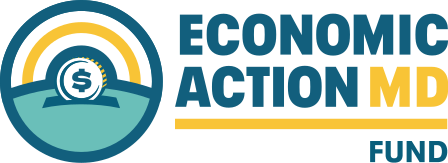Debt Reform
Consumer debt in the United States is approaching a record-breaking $16 trillion, and is in need of reform.
Mortgages, student loans, auto loans, and credit cards were the main areas where Americans fell into debt. Medical debt, which is growing faster than income, is another leading cause of debt. To advance a just economy for all, Economic Action Maryland Fund advocates to end predatory and deceptive loan products, and leads statewide efforts to reform local and state debt collection policies that criminalize poverty and deepen the racial wealth gap.
Advocacy
Debt is a central legislative issue for Economic Action Maryland Fund and we work to create policy that protects Maryland borrowers, decriminalizes poverty, and eliminates the racial wealth divide. Consumer debt including credit card, medical, and municipal debt is rising as costs for housing, healthcare, and college outpace income. Economic Action has been at the forefront of debt reform and has celebrated major victories.
Over the years we have: expanded protections for low-wage workers by increasing the amount of money they can protect each paycheck from debt collectors, increased protections for individuals with medical debt, and enacted the strongest debt management laws in the country. While these are major victories, the fight is not over. We will continue to expand protections for Marylanders faced with rising debts and work to reduce predatory collection practices that drive Marylanders deeper into debt.

debt reform-1

RESEARCH
In Maryland, the cost of living has soared while wages have remained stagnant, lagging far behind housing, student loans, and other costs. Eighty-six percent of low-income renters in Maryland are cost-burdened. For too many low-income Marylanders, the debt burden becomes unmanageable and they fall behind in their payments. Maryland law provides numerous ways for creditors to collect from indebted individuals including body attachments and garnishments. Read more in our report, No Exit: How Maryland’s Debt Collection Practices Deepen Poverty & Widen the Racial Gap. Furthermore, our 2020 report, Preying On Patients, written with our partners, uncovered the predatory pursuit of low-income patients’ medical debt by Maryland hospitals, and set the priorities for our medical debt advocacy.
